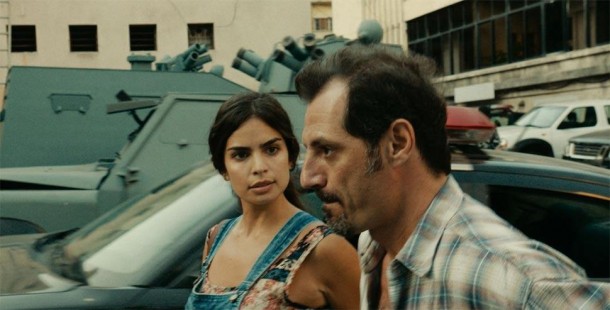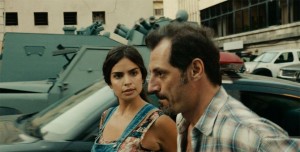
This morning’s Venice competition films could have not have been more different. There was Guillermo Del Toro’s blockbuster THE SHAPE OF WATER, mainstream Hollywood, beautifully framed – but empty and second-hand. Then we watched THE INSULT, by Lebanese director/co-writer Ziad Doueiri (West Beirut), produced by five companies as far apart as Lebanon and the USA and shot on a shoestring, THE INSULT is set in contemporary Beirut, still suffering from the wounds of the civil war. Del Toro’s tale is set in 1962 Baltimore, at the height of the Cold War. Elisa (Sally Hawkins) is a cleaner, isolated, because she is mute. The Defence Ministry Institute she works for, is run by the security villain Strickland (Michael Shannon), who is in charge of an amphibian creature (very much the replica of the creature from the Blue Lagoon), who is also wanted by Russian spies. Elisa and the creature connect and fall in love, and in spite of being shot dead by Strickland, will have a happy under-water future. SHAPE OF WATER is not even secondhand, it is just a wishful retelling of the sort of movies produced by Hollywood in the 50s and early 60s: colourful entertainment for teenagers, before they graduate to adult entertainment. Every shot is artificially framed for the maximum effect, recreating an idyllic world of mild suspense. But the characters are all cartoon figures, making the dialogue superfluous. Production Department and DoP got the Lion’s share of the budget, but the creativity did not stretch to the script department, as is often the case. The result is Jack Arnold meets Douglas Sirk, with Del Toro as the apprentice who loses any originality in the transposition. **
 Ziad Doueiri tries hard to make the most out of his scarce resources and succeeds in keeping the audience engaged during the tale of a seemingly mundane conflict which could have led to an outbreak of civil war in Beirut. Toni is a garage owner in the capital, and not too fond of his Palestinian neighbours. When one of them, Yasser, who works as a para-legal for a building company, repairs the leaking drainpipe of his flat. Toni wants an apology, after having destroyed the new pipe. Toni insults Yasser, shouting that wished General Ariel Sharon had killed all Palestinians. Yasser retaliates, breaking his opponent’s two ribs. In court, Yasser is found not guilty, but Toni does not give up, engaging a new, very political lawyer for the retrial. Yasser is represented by the daughter of Toni’s lawyer, who hates her father. All sides are set for a trial by media, whilst the political atmosphere in the city reaches breaking point, as fighting breaks out in the city starts. Doueiri makes it clear that this is a story of male male egos loving nothing a verbal and physical confrontation. The men hold their other side responsible for their or their family’s suffering, overlooking the 1990s civil war where Christian Falange and Palestinian PLO fighters both committed atrocities against the civilian population. But Toni and Yasser seem to use the past as a competitive replay of whose side suffered the most. Before the opening credits, the Lebanese government insisted on a disclaimer, distancing themselves from the film. We wonder why….. ****
Ziad Doueiri tries hard to make the most out of his scarce resources and succeeds in keeping the audience engaged during the tale of a seemingly mundane conflict which could have led to an outbreak of civil war in Beirut. Toni is a garage owner in the capital, and not too fond of his Palestinian neighbours. When one of them, Yasser, who works as a para-legal for a building company, repairs the leaking drainpipe of his flat. Toni wants an apology, after having destroyed the new pipe. Toni insults Yasser, shouting that wished General Ariel Sharon had killed all Palestinians. Yasser retaliates, breaking his opponent’s two ribs. In court, Yasser is found not guilty, but Toni does not give up, engaging a new, very political lawyer for the retrial. Yasser is represented by the daughter of Toni’s lawyer, who hates her father. All sides are set for a trial by media, whilst the political atmosphere in the city reaches breaking point, as fighting breaks out in the city starts. Doueiri makes it clear that this is a story of male male egos loving nothing a verbal and physical confrontation. The men hold their other side responsible for their or their family’s suffering, overlooking the 1990s civil war where Christian Falange and Palestinian PLO fighters both committed atrocities against the civilian population. But Toni and Yasser seem to use the past as a competitive replay of whose side suffered the most. Before the opening credits, the Lebanese government insisted on a disclaimer, distancing themselves from the film. We wonder why….. ****
VENICE FILM FESTIVAL 30 AUGUST – 9 SEPTEMBER 2017